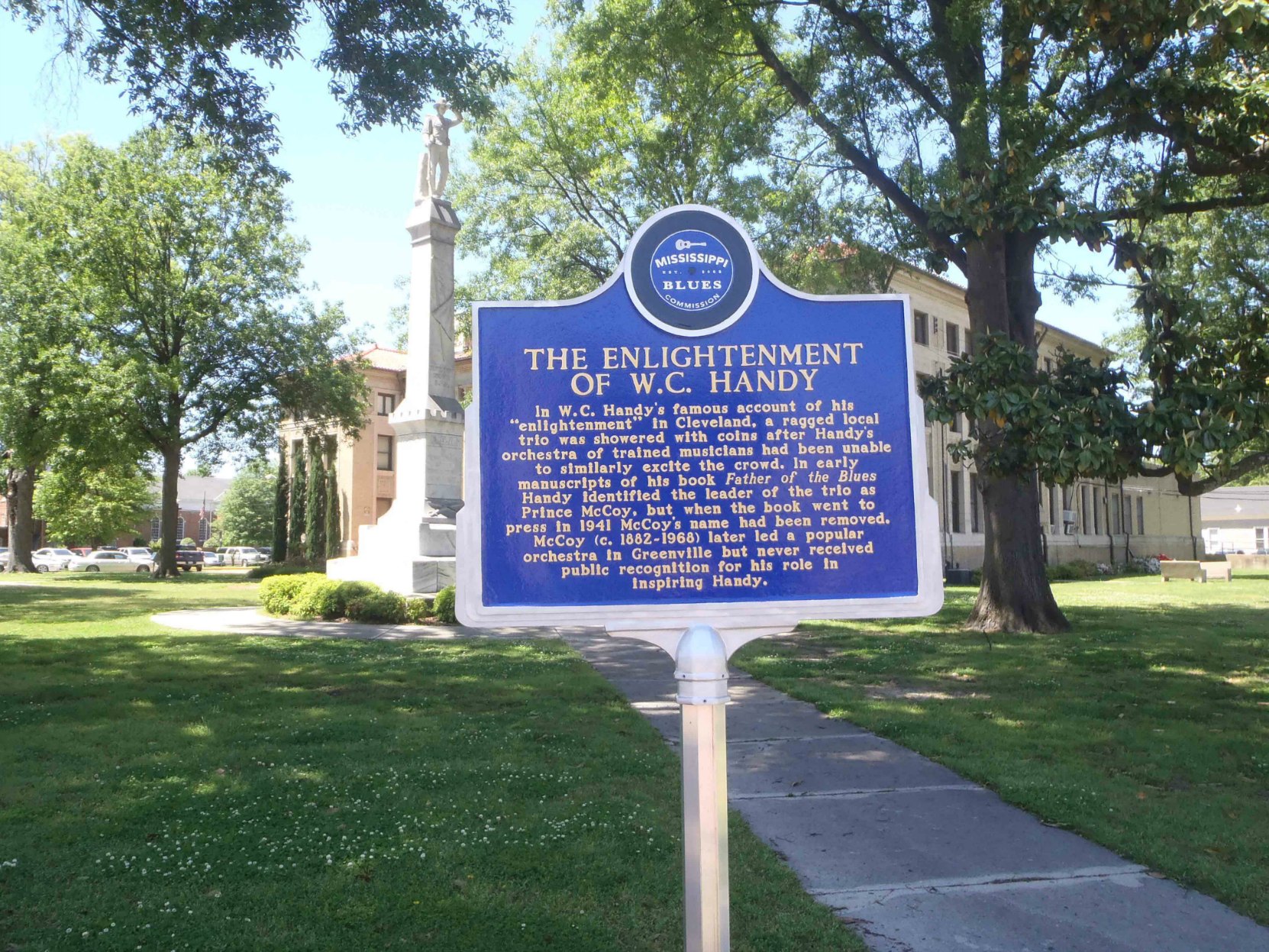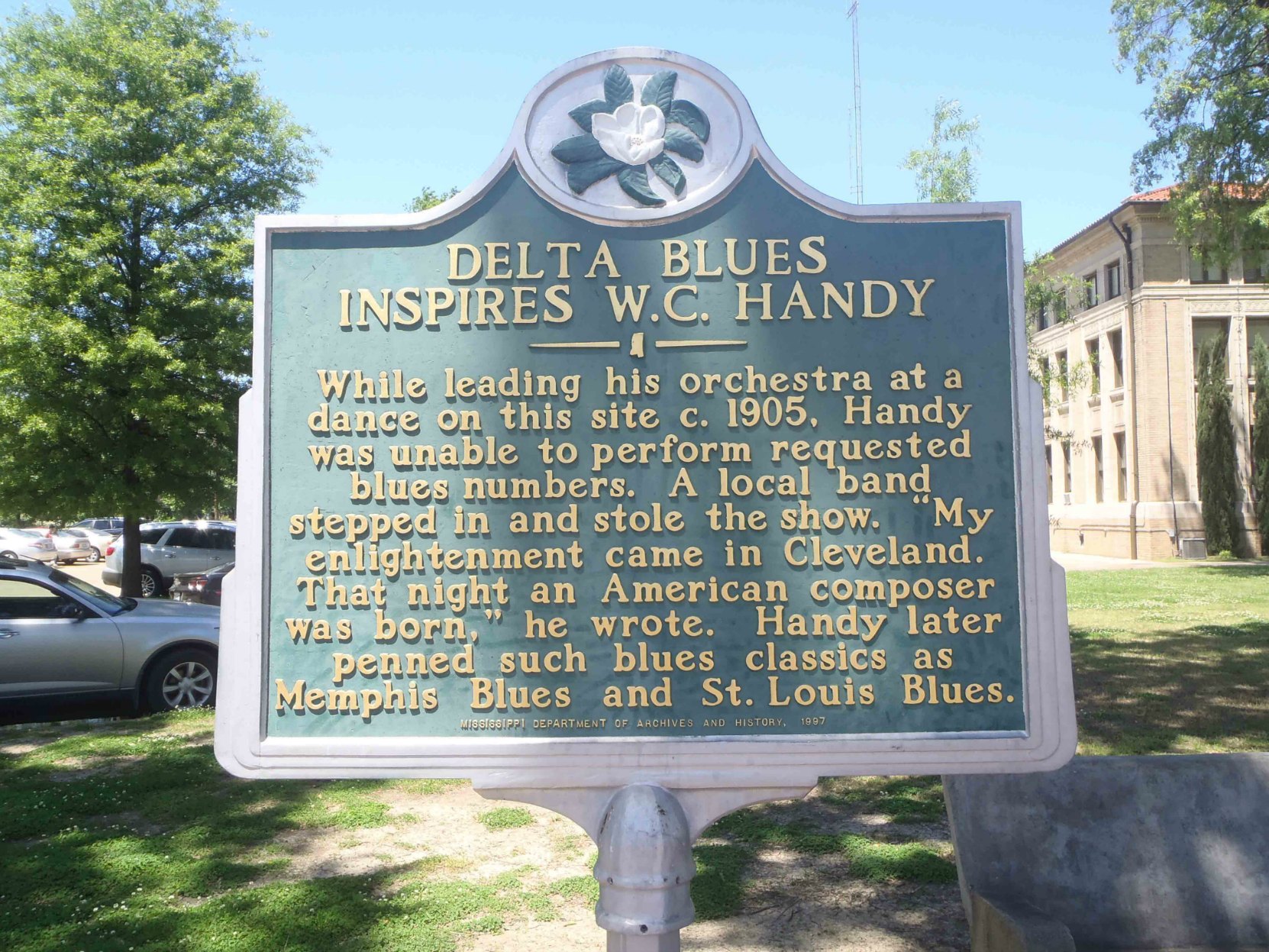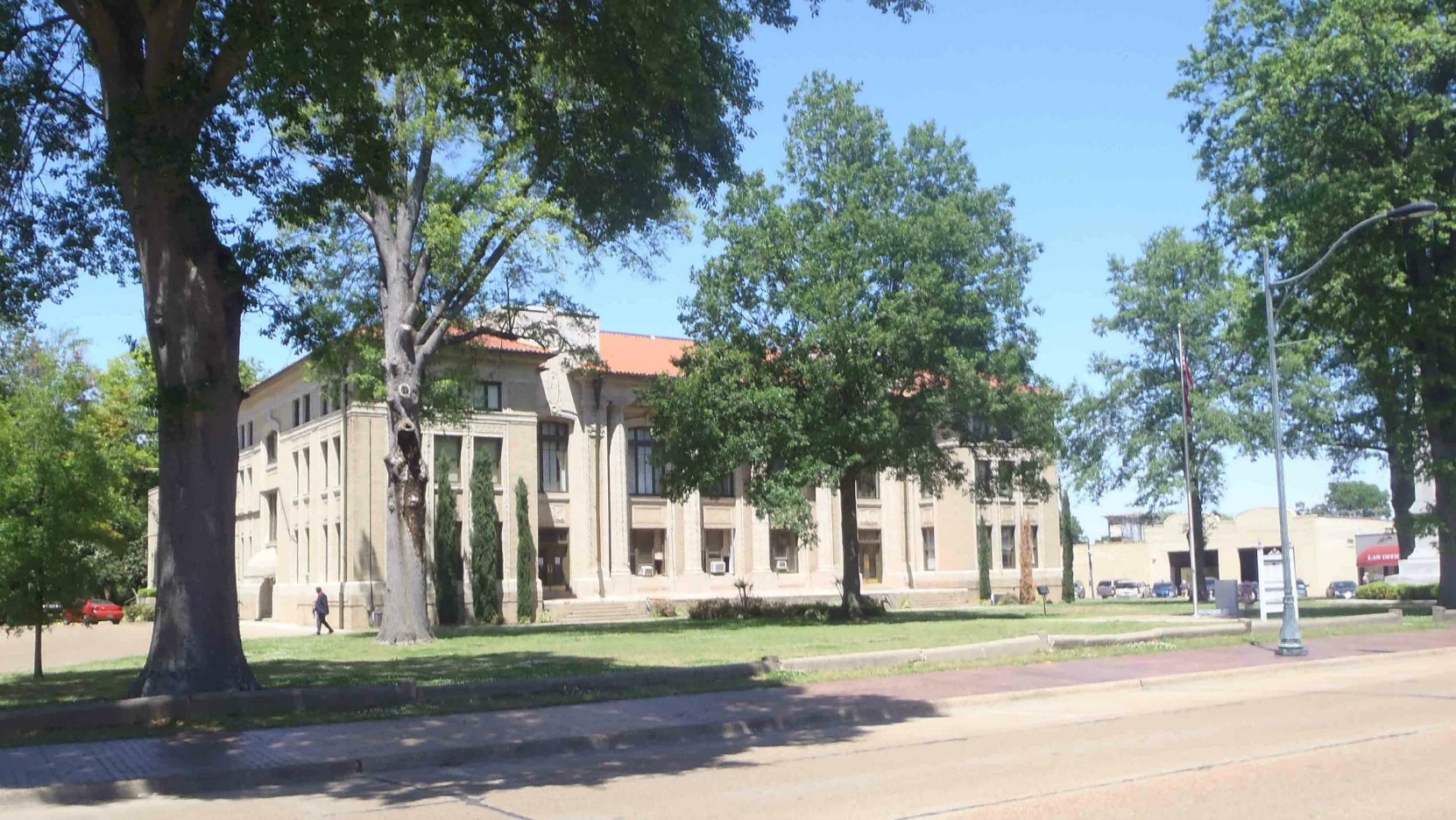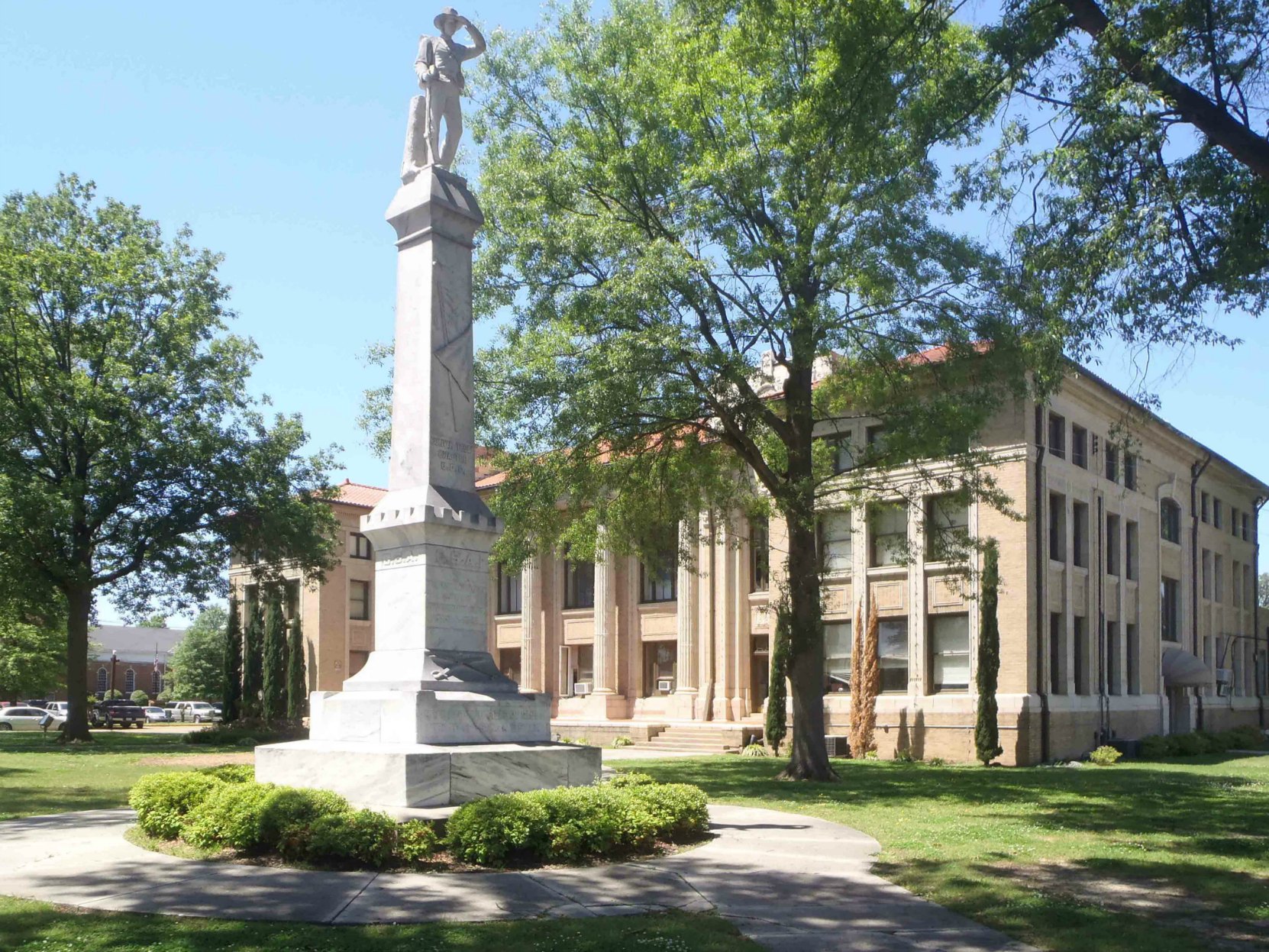Mississippi Blues Trail
This is a significant site in blues history and is commemorated by a Mississippi Blues Trail marker outside the Bolivar County Courthouse, which stands at a location which W.C. Handy mentions in his autobiography as being a place where he encountered the Blues in an incident that, while somewhat embarrassing for Handy and his band, served to move W.C. Handy in a musical direction which left a major influence on American music.
The W.C. Handy “enlightenment” incident in Cleveland, Mississippi, circa 1905, is a significant event in the history of American music.

The photo above shows the Mississippi Blues Trail marker on the grounds of the Bolivar County Courthouse commemorating “The Enlightenment of W.C. Handy.”
The GPS location of this marker is: N 33° 44.655′ W 90° 43.437′
The front of the marker reads:
“THE ENLIGHTENMENT OF W.C. HANDY – In W.C. Handy’s famous account of his “enlightenment” in Cleveland, a ragged local trio was showered with coins after Handy’s orchestra of trained musicians had been unable to similarly excite the crowd. In early manuscripts of his book Father of the Blues Handy identified the leader of the trio as Prince McCoy, but when the book went to press in 1941 McCoy’s name had been removed. McCoy (c. 1882-1968) later led a popular orchestra in Greenville but never received public recognition for his role in inspiring Handy.”
The Mississippi Department of Archives and History has also placed a marker nearby to commemorate this significant event in American music history.

The Mississippi Department of Archives and History marker (shown above) reads:
“DELTA BLUES INSPIRES W.C. HANDY – While leading his orchestra at a dance on this site, ca. 1905, Handy was unable to perform requested blues numbers. A local band stepped in and stole the show. ‘My enlightenment came in Cleveland. That night an American composer was born,’ he wrote. Handy later penned such blues classics as Memphis Blues and St. Louis Blues.”
The GPS location of this Mississippi Department of Archives and History marker is: N 33° 44.654′ W 90° 43.479′
Here is how W.C. Handy described this event in his autobiography:
“……..As a director of many respectable, conventional bands, it was not easy for me to concede that a simple slow-drag and repeat could be rhythm itself. Neither was I ready to believe that this was just what the public wanted. But we live to learn.
My own enlightenment came in Cleveland, Mississippi. I was leading the orchestra in a dance program when someone sent up an odd request. Would we play some of ‘our native music,’ the note asked. This baffled me. The men in this group could not ‘fake’ or ‘sell it’ like minstrel men. They were all musicians who bowed strictly to the authority of printed notes. So we played for our anonymous fan an old-time Southern melody, a melody more sophisticated than native. A few moments later a second note came up. Would we object if a local colored band played a few dances?
Object! That was funny. What hornblower would object to a time-out and a smoke – on pay? We eased out gracefully as the newcomers entered. They were led by a long-legged chocolate boy and their band consisted of just three pieces, a battered guitar, a mandolin and a worn-out bass.
The music they made was pretty well in keeping with their looks. They struck up one of those over-and-over strains that seem to have no very clear beginning and certainly no ending at all. The strumming attained a disturbing monotony, but on and on it went, a kind of stuff that has long been associated with cane rows and levee camps. Thump-thump-thump went their feet on the floor. Their eyes rolled. Their shoulders swayed. It was not really annoying or unpleasant. perhaps ‘haunting’ is a better word, but I commenced to wonder if anybody besides small town rounders and their running mates would go for it.
The answer was not long in coming. A rain of silver dollars began to fall around the outlandish, stomping feet. The dancers went wild. Dollars, quarters, halves – the shower grew heavier and continued so long I strained my neck to get a better look. There before the boys lay more money than my nine musicians were being paid for the entire engagement. Then I saw the beauty of primitive music. They had the stuff the people wanted. It touched the spot. Their music wanted polishing, but it contained the essence. Folks would pay money for it. The old conventional music was well and good and had its place, no denying that, but there was no virtue in being blind when you had good eyes.
That night a composer was born, an American composer. Those country black boys at Cleveland had taught me something that could not possibly have been gained from books, something that would, however, cause books to be written. Art, in the high-brow sense, was not in my mind. My idea of what constitutes music was changed by the sight of that silver money cascading around the splay feet of a Mississippi string band…..”
The dance W.C. Handy played for in Cleveland circa 1905 was held in the Bolivar County Courthouse building. The Courthouse that stood here in 1905 was replaced in 1922 by the current Bolivar County Courthouse building. Here is how the site appears today.


There are some other interesting W.C. Handy sites within easy driving distance of Cleveland. Here are some of the them: Tutwiler, Mississippi, where W.C. Handy first heard the Blues ; Moorhead, Mississippi, “where the Southern cross’ the Dog,” a lyric made famous in W.C. Handy’s 1914 composition, Yellow Dog Blues ; Clarksdale, Mississippi, where W.C. lived between 1903-1905, roughly about the time he was “enlightened” in Cleveland, Mississippi.
While in Cleveland, you may also want to check out the Mississippi Blues Trail marker for Chrisman Street.
Would you like to leave a comment or question about anything on this page?